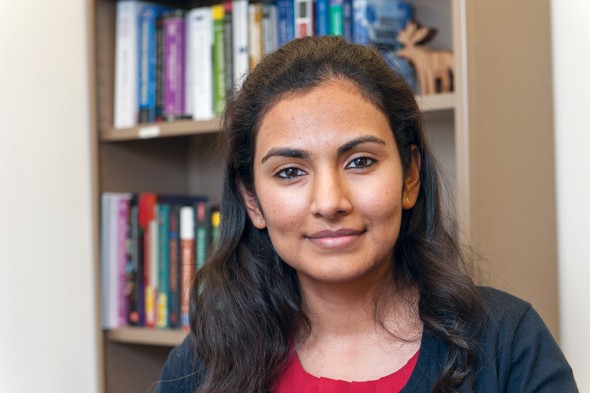Advocating for the education of girls in rural Pakistan

Javaeria Qureshi, assistant professor of economics, studies the impact of educating girls in rural Pakistan. “When parents invest in girls’ schooling, there is a spillover effect on boys,” she says. — Photo: Roberta Dupuis-Devlin
Parents in rural Pakistan know it’s their sons who will support them in their old age, so they see no sense in educating their daughters.
But research by Javaeria Qureshi shows that this practice is shortsighted.
“Girls don’t take care of their parents in their old age, boys do,” said Qureshi, assistant professor of economics in the College of Liberal Arts and Sciences. “That’s their retirement plan — there is no Social Security.
“Girls move out when they get married, and female labor force participation rates are very low. So when they think of schooling, parents have a strong incentive to educate boys — they work and bring in income.
“The parents are poor and constrained by limited resources. They have to think hard about these decisions.”
As a result, 25 percent of girls in rural Pakistan don’t get much schooling — most drop out after elementary school — versus 8 percent for boys.
But Qureshi says that when girls do get more education, there is a payoff.
“My study documents that when parents invest in girls’ schooling, there is a spillover effect on boys,” she said.
“What happens is that older sisters share a lot of responsibility for looking after their younger siblings. They influence the education of younger kids.
“If you have someone better educated looking after you, you learn better. Child development is improved, and they complete more schooling and have improved literacy and numeracy skills.”
Other researchers have found that in both developed and developing countries, children with well-educated mothers do better in school, Qureshi said.
There is another benefit for boys with educated older sisters.
“It’s the tutoring of younger siblings,” Qureshi said. “Older sisters are the most important source of help with studies at home for these kids.
“In my sample from rural Pakistan, only one in four mothers has any schooling at all. Fathers tend to have more, as do older brothers.”
But the males don’t help with kids’ studies because of the gendered division of labor in households. They are working outside the home while older sisters do housework and help their young brothers and sisters with studies.
Reasons to invest in girls’ education
Qureshi believes her research is important. “It shows that even when parents might care strongly about their sons’ education, they still have reason to invest in girls’ education,” she said.
Better-educated mothers have sons who are more successful, and the same is true for older sisters and their younger brothers.
“And these benefits are realized even in the current generation,” Qureshi said. “You don’t have to wait for them to be married and have their own children.”
There is renewed interest in girls’ education in Pakistan because an activist Pakistani schoolgirl, Malala Yousafzai, was awarded a Nobel Peace Prize last year.
The teenager was shot by the Taliban for going to school and advocating girls’ schooling. Yousafzai had been expressing her activism through a blog, and was shot after she abandoned anonymity.
“She was flown to the U.K. for emergency surgery,” Qureshi said. “She’s ended up staying there — she still has death threats but she continues her work.”
Another cultural disadvantage for rural Pakistani girls is that it’s not easy to get to school. Schools are gender segregated and girls who live far from schools get less schooling.
In addition, Qureshi said, “There are cultural norms about girls going outside the house. They’re not to go unaccompanied. And the further it is, the less safe. There’s no public transportation, and girls must walk to school with family members or neighbors.”
The solution? “Provide public transportation and build more schools,” she said.
Qureshi started her research four years ago, and has gone back to Pakistan once a year since then.
She was born in Hong Kong and moved to Pakistan when she was 5. She came to North Carolina, where she has family, to attend the University of North Carolina in Chapel Hill. Her Ph.D. is from the University of Chicago.
Her general research interest lies in education and social issues in developing countries.
“Girls’ education is close to my heart,” said Qureshi, who completed high school in Lahore, Pakistan. “All my classmates are highly educated. It’s a question of being born in middle-class families and living in cities.”
She lives in Streeterville with her husband, Raheel Malik, an information security manager for a financial firm.
Qureshi’s English is flawless because, although she was born in Hong Kong, it’s her first language. She attended the American school in Hong Kong.
“I learned Urdu when we moved to Pakistan,” she said.
